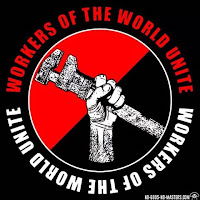The Socialist Party advocates the expropriation of the landed and capitalist class, the deprivation of their way of living and the organisation of the wealth-producing by the whole people acting in co-operation, for the benefit of all. The socialist commonwealth is a society in which land and property are communally owned and the processes of production, and distribution are social functions. Socialism is the ownership of the means of life by the people and for the people. The object of the Socialist Party is to secure the common ownership of all the means of production and distribution.
The Socialist Party position is plain. It invites votes from socialists on a socialist programme, that and nothing else. It campaigns for socialism, telling the workers that no change in the administration of capitalism will raise them from their subject position in society. We must use elections to teach fellow workers the connection between their employer and the state and the connection between their status and the economic system.
While the end in view must be an economic one, it does not follow that the means to that end is an economic one also. The ruling class do not rule the workers simply because they are owners, but they are able to continue their rule and domination because they control the political machinery which gives them the protection necessary to maintain their position. The working-class, therefore, must get control of this same political machinery in order to get access to economic possession. The mere refusal of the workers to give up the fruits of their toil is insufficient without the power to back up their refusal. Industrial action or striking does not bring the workers into possession, but leaves the owners in complete ownership of all the means of life. A general strike is a policy which brings the workers up against the full forces of government without in any way giving the workers any access to the means and instruments of production, or the wealth already produced.
Poverty is when people are not able to secure for themselves all the benefits of civilisation. If a person is only able to provide oneself and his or her family with the bare necessaries of existence, that family is living in poverty since they cannot enjoy the advantages of civilisation and so might just as well be a slave.
What are rights under capitalism? The right of private property, the right of a few to own and control the means by which all must live, the right of the owners of the means of production to utilise it to exploit the rest of the community in the interest of their personal profit, the right to determine what shall be produced and how, regardless of the misery and wretchedness of those who produce it. The right to private property, the right to exploit, the right to rob, the right to over-produce and cause crises, the right to compete, and cause wars.
The Socialist Party answer? The abolition of the right of private property, and instead the common ownership of the means of production, so that all may enjoy the fruit of their labour. It is as simple as this – a choice between two worlds, a world of exploitation, social injustice, chronic insecurity, economic crisis, and recurring wars and a world of proper economic planning, increasing living standards, prosperity and a durable peace.
The Socialist Party is not out to create a bloody revolution but to work for the improvement of the conditions of the people. Its understanding of social science teaches that in the long run, such is capitalist development, that improvement can only be attained by changing basic social relations, by a shift in ownership and control from the few to the many, all-embracing socialisation where the whole of society is changed by the elimination of the private ownership of the entire means of production, socialism.
The following are humankind’s prime necessities: Air, water, food, clothing, shelter and good health. Without air we should die in a few minutes ; without water, in a few days. Socialism simply means that the basics for life shall be supplied similarly without question or condition; that they shall not be for the benefit of profit-makers, that access to them shall not be through a check-out bearing the sign, “Pay Here.” Without the necessities of life we die. To obtain them we hire ourselves for a period to those who own the means whereby we live. How do they make and retain themselves masters of our lives? By force and custom. We propose to dissolve the first by converting a majority to our opinion, and at an election taking control of the machinery of government. We propose to vary the second by substituting common ownership of the masses whereby we all live, for private ownership of them. When people thoroughly understand these simple facts, we venture to think they will have a diet of choice food, roomy houses instead of stuffy boxes, long-lasting clothing instead of shoddy rags.
Socialism will not abolish earthquakes, volcanoes and tornadoes, storms and blizzards and other natural hazards but will effectively mitigate the effects of them.






